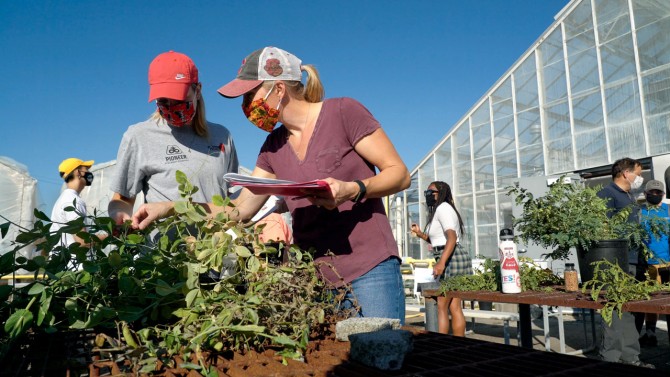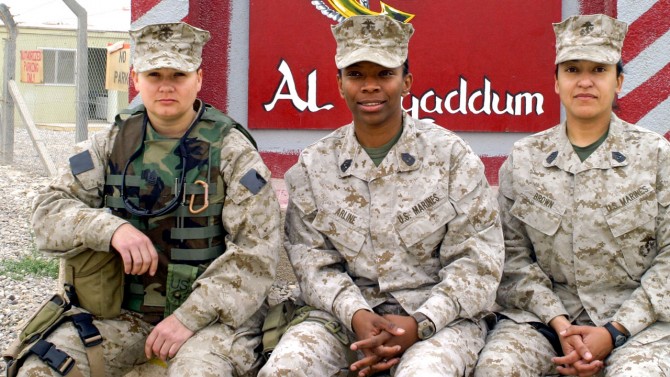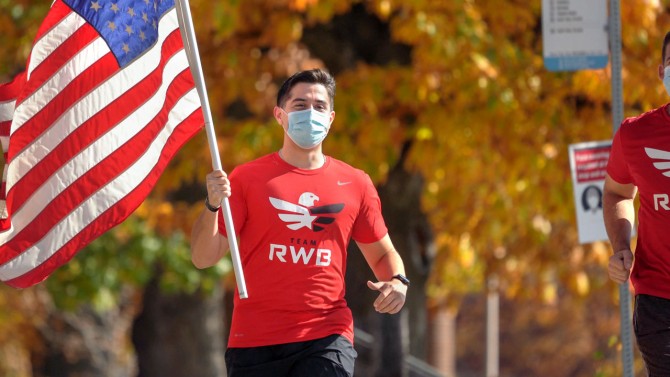More than 200 military veterans are currently enrolled at Cornell as undergraduate, graduate and professional students. Marine Corps 1st Sgt. Mary Fisk is the student veteran adviser and program manager who helps the transition from military life to campus life.
More student veterans join a welcoming community
By Joe Wilensky
Jenny Cunningham, a former staff sergeant in the Marine Corps, wanted to go back to college for a degree in sustainable agriculture. But as a veteran and at age 40, she wondered if she would really fit in an undergraduate population.
At Cornell, “I was welcomed with open arms,” she said, “and I was really surprised – because it was almost like an instant family.” Cunningham is now a junior transfer student in the College of Agriculture and Life Sciences.
“In all of my classes, I could literally be their mother, but they are so graceful, they’re just fantastic human beings. And I’ve never felt once – by a professor, or fellow students – [treated] like I didn’t belong,” said Cunningham, who had served for eight years, deploying to Iraq and then Kuwait, where she worked as a logistician, coordinating personnel and equipment – the “beans, bullets and bandages.”
“As a veteran, I think that’s one of the struggles that we have: ‘Maybe I don’t belong,’” Cunningham said. “But the Cornell community has made me feel at home since the day I got here.”
Cornell continues to build a community that welcomes veterans to the university, based on an array of programs and resources that proactively address their needs and draw on their strengths and experiences.
While still a small percentage of the overall student population, Cornell’s student veteran community has been experiencing significant recent growth that has been several years in the making. A dedicated team in the university’s admissions offices has been working successfully to support Provost Michael Kotlikoff’s directive to increase veteran undergraduate enrollment at Cornell as well as boosting related programming and services.
According to Kyle Downey, senior associate director of admissions and veteran recruitment coordinator, a critical piece of this year's surge in veteran students’ numbers is retired Marine Corps 1st Sgt. Mary Fisk, who was named Cornell’s student veteran adviser and program manager in summer 2019.
Fisk, a combat veteran, spent 22 years in the Marine Corps, from 1984-2006. She later went to Penn State and earned undergraduate degrees in French and German studies. She also worked as the university’s coordinator of veterans outreach and has worked in positions supporting military-connected students since 2011.
This fall has seen the largest incoming cohort of undergraduate student veterans at Cornell in more than four decades: 33, comprised of 28 transfer and five first-year students. The total number of enrolled undergraduate student veterans is now 67, up from 41 just a year ago. Additionally, there are about 166 graduate and professional student veterans enrolled.
That growth is thanks to a multipronged approach that includes dispelling myths about the affordability and accessibility of an Ivy League education for veterans.
Many prospective student veteran applicants have questions like Cunningham’s, about how they will fit in, Fisk said. “A lot of veterans will be pleasantly surprised by how accepted, and how curious, their fellow students are who don’t have a military background,” Fisk said. “So it’s not a matter of [students’] ignorance or distrust, or not liking the military. It’s just a matter of not knowing, and being open to that curiosity.”
Easing the transition to student life
Cornell’s history of military education dates back to its founding and includes establishing an ROTC unit in 1917. Cornell graduates have served in every major conflict since the Spanish-American War. The university commissioned more officers in World War I than any other U.S. institution, including the military academies. During World War II, more than 20,000 Cornellians served in the armed forces.
Cornell has “maintained those military roots throughout its history, really never wavering,” Fisk said. “So that’s definitely something that gives veterans some sense of welcoming, community and acceptance, before they even get here.”
Student veterans add a crucial part of the diverse population Cornell is known for.
“I think veterans bring something extra to the table, just like any other diverse population,” she said. “Students who have a global perspective can add to the conversation when they’re in class, and can bring those perspectives in about what their real-world experience has been, what has shaped their mindset and their worldview.”
New programming for student veterans includes the Veterans Summer Bridge Program, for accepted student veterans to help them prepare for the fall semester. Enrollment in this program significantly increased this past summer due to the coronavirus pandemic, Fisk said; because it was all held online, the program was more accessible, and participation jumped from five in 2018 to 19 this year.
Michael Sanchez, a former aircraft electronic technician and former sergeant in the Marine Corps, found the Veterans Summer Bridge program exactly what he needed to transition to Cornell. “I was definitely not ready to just jump out of the Marine Corps and just straight into the semester,” he said. “It provided that buffer period for me. And, as far as it being virtual, … I was able to interact with my family and friends while still going to school, which was nice.”
As a transfer sophomore in the ILR School, Sanchez ’23 is thinking about a career in government in a service field where he can make a difference in people’s lives.
He began to think about applying to colleges when he learned about the Service to School program, a nonprofit that provides free college and graduate school counseling to veterans.
“Cornell was my reach school,” said Sanchez, a Texas native. “It was an I-didn’t-really-think-I’d-get-in kind of a deal. But I was paired up with a mentor with Service to School who was very helpful and they broke down those barriers for me – and it didn’t seem so far off.”
Sanchez, 24, said he had been nervous about making the transition back to academia and about the age gap with his fellow students. “It almost feels like a big family,” he said. “We’re in a group chat, we keep in touch, and I’ve made several friends, both in summer school as well as here. We have video Zoom conferences to get to know each other and to bounce ideas around about getting more veterans to Cornell.”
Cornell also offers the Fall Veterans’ Seminar (ALS 1100), a new course focusing on the sometimes difficult transition student veterans experience going from a military or community college setting to Cornell. The seminar explores the new identities student veterans may be struggling with; introduces them to available resources and opportunities, including career exploration; pairs them with mentors; and connects them with others on campus and in the Ithaca community.
Fisk’s team has created a new website for student and military-connected students at Cornell, at veterans.cornell.edu. She focuses on veterans’ support and advocacy, military appreciation, work/study positions and an increased social media presence. This site adds to existing online resources such as military.cornell.edu, for Cornell’s student, faculty, staff and alumni military.
Fisk regularly stresses to prospective students that a Cornell education is affordable.
“Cornell’s financial aid is really leading the pack,” she said, noting that student veterans can either use their G.I. Bill or a financial aid package constructed specifically for them. This can give undergraduates the option of saving their G.I. Bill funding for graduate school.
“So veterans can leave here with a fantastic education, and then go on forward and make an impact in the world and do good things,” she said.
Additional resources across campus include the Cornell Undergraduate Veterans Association (CUVA), which focuses on creating a community and supporting advocacy for veterans and helps with career focus needs; Fisk collaborates with the group often.
Fisk also said she enjoys a productive, beneficial relationship with the Cornell Reserve Officer Training Corps (ROTC). “It’s an absolutely wonderful staff, and the officers and the enlisted folks there just couldn’t be more welcoming, approachable and open,” she said. “There’s no reason that fellow veterans and fellow active duty service members can’t have a great relationship.”
Students’ experiences
Cunningham said that despite the COVID-19 restrictions on in-person gatherings, she quickly connected with Cornell’s student veteran community through Zoom sessions and other online group events.
Like many transfer students, she tries to balance work life and home life. The Minnesota native had decided to go back to school when her husband, Marine Corps Major Thomas Cunningham, recently became an executive officer and associate professor of naval science for Cornell’s Naval ROTC program, and they and their three children moved to Ithaca.
“I’m a mom, I’m a wife, I’m a student. All three of those are very important, but they’re also all very time intensive,” she said. “At the same time, I want to be able to build a relationship and a sense of community here with fellow students. And I really feel like I’ve been able to do that.”
So has Devlin Babcock, 26, a native of Oswego, New York, who joined the Navy after graduating from high school in 2013.
He was a petty officer, second class, and worked as an aviation electrician on the electrical components of helicopters and drones. He then enrolled at Onondaga Community College (OCC) in Syracuse, New York, to study engineering science.
“I knew I wanted to get into electrical and computer engineering,” he said. “And I found out from my veteran advisor at OCC that Cornell was trying to get more veterans, and I figured I should probably try to get into the best school I can. So I applied to Cornell and got accepted – and here I am, majoring in electrical and computer engineering.”
His biggest concern about before arriving at Cornell “was what the students were going to be like,” he says. “I was worried that everyone was going to be a super genius, and that I had slipped through the cracks and somehow gotten in here.”
But through the Veterans Summer Bridge Program, “I learned that everyone is just a normal person,” he said. “That fear of mine, where I wouldn’t be able make friends, is just completely gone at this point.”
Media Contact
Get Cornell news delivered right to your inbox.
Subscribe



